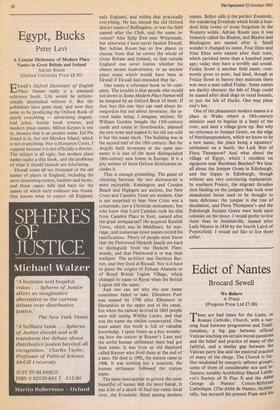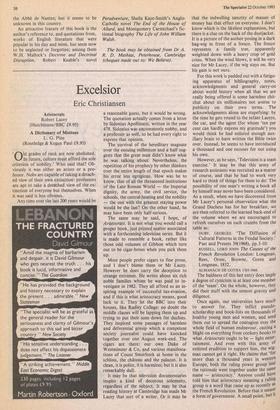Edict of Nantes
Brocard Sewell
We Believe A Priest (Progress Press Ltd 0.00)
These are bad times for the Latin, or 1 Roman Catholic, Church, with a run- ning feud between progressives and Tradi- tionalists, a big gap between official Vatican teaching on certain moral questions and the belief and practice of many of the faithful, and a similar gap between the Vatican party line and the pastoral practice of many of the clergy. The Church is fur- ther weakened by energetic splinter groups, some of them of considerable size and in- fluence; notably Archbishop Marcel Lefeb-, vre's Society of St Pius X and the Abbe George de Nantes' Contre-Reforme Catholique. (The Abbe de Nantes, inciden- tally, has accused the present Pope and his predecessor Paul VI of teaching a heretical culte de l'homme, a charge presented in detail in his books Liber Accusationis, one and two. These volumes have been receiv- ed, but not officially 'accepted', at the Holy Office, and the pontiffs concerned have certainly read them. No attempt at rebuttal has been made, and the Holy Office has had to concede that the Abbe's own writings are free from error. Nevertheless, the Holy See obstinately refuses to judge this case. The Abbe is suspended in his own diocese, and in 1969 was subjected to a 'dis- qualification' by the Holy Office; a penalty of which he remarked that it was 'sportive plut6t qu'ecclesiastique'!) Worst of all, perhaps, has been the aboli- tion — contrary to all ecclesiastical canons — of the historic liturgy of the Western Church, and the infection of substantial numbers of bishops and clergy, to say nothing of the laity, with 'Pentecostal' il- luminism. All of which is the result, if not the direct consequence, of that nefaste con- cik Vatican II.
Those who reject this picture of the pre- sent state of Roman Catholicism claim, not without some justification, that the aboli- tion of rigid church 'structures', and the disappearance of feudal authoritarianism and byzantine liturgical splendours, have been-to the Church's spiritual advantage.
In England, as almost everywhere else, except in Africa, the number of converts has fallen catastrophically, and the priesthood seems threatened with virtual extinction, for lack of recruits, unless it is opened to married men; or even, possibly, to women?
In such a situation — more confused surely than that for which Catholics used to mock Anglicans — what does a priest say to such people as still ask for instruction in the faith?
This book, We Believe, goes a long way towards answering this question. It is a very Clear and solid presentation of traditional Roman Catholic Christianity, which is related to the nefaste concile by solid ex- tracts from its decrees.
The provenance of this book is obscure. It bears no publisher's imprint, only the name and address of the Maltese printers, Who have not made a bad job of it. But no doubt it would be easy enough for any enterprising bookseller to trace it to its source. The title-page gives it as written by A Priest', but a short Preface appears over the initials A.N.G. Shall we be far out, I wonder, if we conclude that the author is the venerable Monsignore Alfred Newman GlIbey, Protonotary Apostolic ad instar Participantium?
We Believe is based on instructions which the author has given to inquirers, and is firmly based on what we used to call The Penny Catechism; i.e., the Catechism of Christian Doctrine drawn up by the Vicar Apostolic of the London District, Bishop Richard Challenor, in the 18th century. The 1,ate Father Vincent McNabb judged this to oe an unrecognised theological masterpiece, and caused it to be printed in a fine edition,
on handmade paper, at St Dominic's Press, Ditchling, in 1930. The edition used by A.N.G. is that of 1971, which has undergone certain revisions. Thus, treating of the Seventh Commandment, Thou shalt not steal, the old Catechism said: It is dishonest for servants to waste their master's time or property, because it is wasting what is not their own.
The 1971 revision says:
It is dishonest for workers to waste their employer's time or property, because it is wasting what is not their own.
A.N.G. says that this causes him wry amusement. 'Workers presumably must not be considered the servants of their masters. It is very sad to consider how the whole concept of service and servants is now held to be a derogatory one.'
In treating of the mystery of the cucharist the author bases himself on St John's Gospel and St Thomas Aquinas's hymn for the feast of Corpus Christi, 'Lauda, Sion'. Admirable! But it is a pity that he does not cite the fine verse-translation of this hymn by Fr Dominic Aylward, 0.P., rather than supplying a mere prose rendering. And his rigid adherence to a mediaeval scholastic theology of the eucharist is not helpful to- day. Admittedly, modern theories of tran- signification have failed to replace the Aristotelian-Thomistic transubstantiation, Much more successful, at once orthodox and original, is the eucharistic theology of
the Abbe de Nantes; but it seems to be unknown in this country.
An attractive feature of this book is the author's reference to, and quotations from, works of English literature that were popular in his day and mine, but seem now to be neglected or forgotten; among them W.H. Mallock's Doctrine and Doctrinal Disruption, Robert Keable's novel Peradventure, Sheila Kaye-Smith's Anglo- Catholic novel The End of the House of Allard, and Montgomery Carmichael's fic- tional biography The Life of John William Walsh.
The book may be obtained from Dr A. R. D. Mathias, Peterho use, Cambridge (cheques made out to: We Believe).
















































 Previous page
Previous page